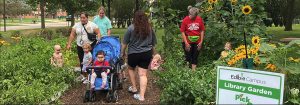‘Edible’ NIU transforms hearts and minds
Northern Illinois University — April 24, 2024
In 2023, Northern Illinois University’s Edible Campus provided fresh ingredients for over 9,000 meals through Campus Dining Services and the Huskie Food Pantry. NIU students and community members harvested 500 pounds of produce from the 100-plus free-to-pick beds.
In 2023, NIU’s Edible Campus program broke ground on more than 100 raised beds throughout campus as well as the 5,000-square-foot Anderson Market Garden. One year later, the campus – and many hearts and minds – have been transformed.
“During the pandemic we learned how fragile our global food system is,” said Bryan Flower, assistant director of food systems innovation. “Making our food systems more resilient is one of the core challenges of our time, and NIU is uniquely positioned to make a difference.
“Edible Campus is a collection of gardens that provides fresh food for food insecure students, who can access food by picking it as they walk along or in the dining halls or the Huskie Food Pantry. It’s also a living laboratory of food systems research that will help to transform our region and inspire our students to create a more sustainable future.”
In its first year, Edible Campus provided fresh ingredients for over 9,000 meals through Campus Dining Services and the Huskie Food Pantry. NIU students and community members harvested 500 pounds of produce from the 100+ free-to-pick beds. Staff and volunteers harvested over 3,000 pounds of produce from the Market Garden. And the meal prep program provided free food and instruction to help NIU students prepare over 750 meals in the fall 2023 semester alone.
“Edible Campus is impactful and inspiring,” says Rena Cotsones, Ph.D., NIU vice president of Outreach, Engagement and Regional Development and chief engagement officer. “We can see the short-term impact right away in the production of healthy food that nourishes our community. Long term, we know that people are thinking more deeply about food justice, the sources of healthy foods, sustainable practices and how to improve our regional food systems.”
This year, the gardens are expanding and beginning to provide valuable research data as well as fresh local food.
Hydropod Container Growing Unit
In December, NIU received a 40-foot-by-8-foot container gardening system provided by ComEd and the Electric Power Research Institute (EPRI). Several NIU faculty and staff members have completed training on the Hydropod, and the first seedlings are now growing. The hydroponic container gardening system is great for growing leafy greens.
NIU’s Hydropod is part of a nationwide project to collect data on growing conditions, energy use and produce yields that will help to improve container gardening systems so communities can fight food insecurity. NIU is one of four Chicago area organizations participating in the project.
“We’re excited to be in conversations with the other Chicago area organizations managing their own hydropod systems,” Flower says. “Organizations such as Grow Greater Englewood, the Emerald South Economic Development Collaborative and the Young Men’s Educational Network of Lawndale are working to fight food deserts in their neighborhoods. We’re excited to continue growing our connections to nonprofits in the region who share our mission to make nutritious, sustainably grown food accessible to all residents.”
Huskies United Fundraiser and Composting Program
The Edible Campus program just completed a successful fundraiser as part of Huskies United.
The original goal of $5,000 was exceeded, and $6,505 is now available to fund the construction of a three-bay composter. The composter – to be located in our Anderson Market Garden – will transform yard waste and food scraps into nutrient-rich soil that will feed plants and the community for years to come.
“Composting creates a virtuous cycle – turning yard waste and food scraps into next year’s nutritious food,” says Flower. “This composter will contribute to NIU’s goal of sustainability, and we’re thrilled to be part of the campus’s larger sustainability and climate action plan.”
Future Plans
As Edible Campus expands, the program is pursuing funding to build a mobile refrigerated wash-and-pack unit. This unit will help volunteers and student workers more efficiently harvest, wash and pack vegetables for distribution. The team also plans to share the unit with beginning and underrepresented farmers in our region, helping to lower barriers to farming and strengthen local food systems.
“Illinois has an abundance of farms, yet most of the food consumed in the state is not locally produced. We hope to lower the many costs for beginning farmers to support a more diverse local farming economy,” says Flower.
Flower says a vegan/vegetarian food truck is also in the works – as both a revenue source to support Edible Campus and a training ground for students interested in food professions.
“We’ll be filling a consumer niche by offering healthy, plant-based food options, as well as making Edible Campus financially sustainable,” says Flower. “I’m excited to share my experience as a farmer and a chef with students so they can become familiar with every step of growing, preparing and distributing food.”







